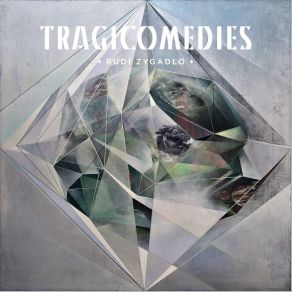Tragicomedies
Download links and information about Tragicomedies by Rudi Zygadlo. This album was released in 2008 and it belongs to Electronica, Dancefloor, Dance Pop genres. It contains 13 tracks with total duration of 44:01 minutes.

|
|
|---|---|
| Artist: | Rudi Zygadlo |
| Release date: | 2008 |
| Genre: | Electronica, Dancefloor, Dance Pop |
| Tracks: | 13 |
| Duration: | 44:01 |
| Buy it NOW at: | |
| Buy on iTunes $9.99 | |
Tracks
[Edit]| No. | Title | Length |
|---|---|---|
| 1. | Kopernikuss | 2:32 |
| 2. | Melpomene | 3:56 |
| 3. | Russian Dolls | 4:04 |
| 4. | An Introduction | 2:41 |
| 5. | Tragicomedy | 3:24 |
| 6. | The Domino Quivers | 3:55 |
| 7. | Persephone | 1:11 |
| 8. | Catharine | 3:33 |
| 9. | The Deaf School | 4:51 |
| 10. | Black Rhino | 1:56 |
| 11. | Waltz for Daphnis | 3:58 |
| 12. | On | 3:41 |
| 13. | Variously Made Men | 4:19 |
Details
[Edit]Scottish producer Rudi Zygadlo's 2010 debut, Great Western Laymen, was a dizzying, kaleidoscopic affair, an even more overstuffed, color-saturated elaboration on the maximalist "wonky" school of fellow Glaswegians Rustie and Hudson Mohawke. Although it could be almost as easily filed under prog and/or pop, it had a recognizable (albeit strained-to-bursting) dubstep current running through even its most iconoclastic tracks. While (thankfully) more focused, Tragicomedies is — almost unimaginably — an even odder fish; forgoing any dancefloor pretensions (and most "beats" altogether) and drawing most of its sonic material from keyboards, voice, and strings, it's difficult to even soundly classify as electronica, let alone anything more precisely descriptive. Every bit as playful and cerebral as its predecessor, and with fellow U.K. eccentric Max Tundra as perhaps the only readily relevant reference point, it finds Zygadlo staking out a hitherto uncharted intersection of AM soft pop schmaltz, classically informed instrumentalism (Bartók, Janácek, and Schnittke are among his avowed and more-than-plausible influences), and a sort of "interventionist" use of technology, wherein — notwithstanding the lustrous, detail-oriented synth textures and some skittering programmed beats here and there — electronics serve mostly to structure, sequence, and gleefully, transparently twist and manipulate sound, rather than generate it per se. On some deep, perhaps at times purely theoretical level, this is a singer/songwriter album, although our access to the songs themselves is rather contingent. The first, perhaps most straightforward example comes within the opening seconds of "Kopernikuss," whose quaint piano and voice chorale, all stately trills and virginal Beach Boys harmonies, starts to wobble on and off pitch — just subtly screwy at first, then in increasingly erratic, seasick swoops. Elsewhere, alongside more foreseeable squelching synths and digi-funk glitchery, we're plunged into rabbit-hole mazes of criss-crossing, quantized piano and demonic accordion ("Melpomene") or vortices of stridently bowed strings and zinging, cartoony Raymond Scott percussion ("Black Rhino.") Keeping with his oft-cited interest in post-modern literature, Zygadlo approaches composition with a puzzle-lover's mentality — as he sings on "The Domino Quivers": "it's a plot with no ending, only many beginnings." What does emerge, songwise, through all the digital manhandling tends toward a cheery, mawkish lushness reminiscent of '70s studio twiddlers like Todd Rundgren, Steely Dan, and Electric Light Orchestra, with wryly earnest vocals (Zygadlo proves himself a deft, versatile singer, veering from a serviceable blue-eyed croon to dippy scatting to oddly creepy, syrupy falsetto) and bone-dry drollery to match; viz, setting perhaps the album's sharpest hook with the words "I think I'm losing my hearing." Or the almost-title track (apparently inspired by true events), which runs, in part: "You saved my life/how embarrassing...the trauma made me a little selfish/that's why I forgot to thank you." Then there's the twinkling "Waltz for Daphnis," wherein an unusually fervent-sounding Zygadlo laments: "I'm not garish enough for your love." It's an assertion that, musically speaking, is remotely plausible only if directed at listeners single-mindedly anticipating Great Western Laymen II. Tragicomedies itself is, unquestionably, garish (not to mention inventive, befuddling, and delightful) enough to fully deserve anyone's love. ~ K. Ross Hoffman, Rovi